Introduction and Summary
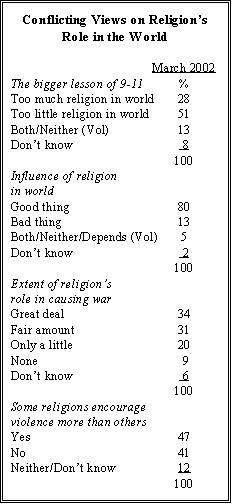 As a religious people, Americans are unsure about how to judge a world that seems increasingly in conflict along religious lines. The public overwhelmingly sees religion’s influence in the world and the nation as a good thing. And by 51%-28%, Americans think the lesson of Sept. 11 is that there is too little, not too much religion in the world.
As a religious people, Americans are unsure about how to judge a world that seems increasingly in conflict along religious lines. The public overwhelmingly sees religion’s influence in the world and the nation as a good thing. And by 51%-28%, Americans think the lesson of Sept. 11 is that there is too little, not too much religion in the world.
But the public does not see all of religion’s effects as positive. A 65% majority believes that religion plays a significant role in most wars and conflicts in the world. Further, while most say that Islam is no more likely to encourage violence than other religions, a plurality of Americans believe that, in general, “some religions” are more likely than others to encourage violence. Those who think that some religions are more violent than others are more likely to see widespread anti-American sentiments among Muslims.
In that connection, while the current survey continues to find the public holding a favorable view of Muslims in this country, Muslims not identified as Americans get a more mixed review. When Islam is rated, favorable responses outweigh unfavorable ones by a thin 38%-33% margin.
Americans do not speak with one voice on these difficult questions. The most secular and liberal elements of the country are more critical of the role of religion in general terms, but have a more favorable view of Muslims and Islam. Conservative groups, including white evangelical Protestants, hold the opposite opinions. They are more supportive of the role of religion in the world, but hold more negative views of Muslims.
There are no divides, demographic or political, in the public’s overwhelming rejection of the idea that Sept. 11 was a sign that God no longer protects the United States. Only 5% hold that view, while 91% disagree. It should be noted that about half of Americans believe that the United States has had special protection from God but almost all who hold this view think that other nations besides the United States also receive this protection.
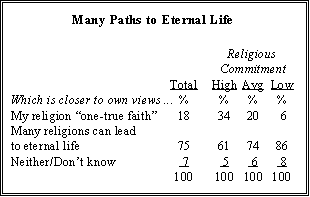 The nationwide survey of 2,002 adults, conducted Feb. 25-March 10 by the Pew Research Center and the Pew Forum on Religion and Public Life, also finds strong expressions of religious inclusiveness. An overwhelming majority (75%) say that many religions can lead to eternal life, compared with only 18% who regard their own religion as the “one true faith.” Those with a high level of religious commitment are more likely to see their own faith as the only path to eternal life. Still, nearly half of highly committed white evangelical Protestants (48%) say many religions can lead to eternal life.
The nationwide survey of 2,002 adults, conducted Feb. 25-March 10 by the Pew Research Center and the Pew Forum on Religion and Public Life, also finds strong expressions of religious inclusiveness. An overwhelming majority (75%) say that many religions can lead to eternal life, compared with only 18% who regard their own religion as the “one true faith.” Those with a high level of religious commitment are more likely to see their own faith as the only path to eternal life. Still, nearly half of highly committed white evangelical Protestants (48%) say many religions can lead to eternal life.
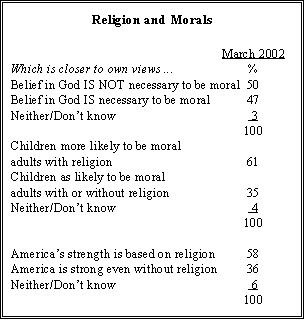 Yet Americans are conflicted over the centrality of religion to personal morality. The public is split about equally over whether belief in God is necessary for one to be a moral person (50% say such belief is not needed, 47% disagree).
Yet Americans are conflicted over the centrality of religion to personal morality. The public is split about equally over whether belief in God is necessary for one to be a moral person (50% say such belief is not needed, 47% disagree).
There is somewhat more agreement that children raised with religious faith are more likely to grow up to be moral adults. Six-in-ten (61%) believe this, but about a third hold that children raised without religion are just as likely to grow up to be moral. A comparable majority (58%) says the strength of American society is predicated on the religious faith of its people, while 36% think that society would be strong even if most Americans lacked religious faith.
African-Americans, Southerners and older people especially women are among those who see the link between religion and morality as very important; other groups, including men, younger people and college graduates, are less likely to say that religion is a prerequisite for morality. Politically, conservatives especially conservative Republicans place the most importance on the connection between religion and morality. Independents and liberal Democrats attach the least importance to the religion-morality link.
Americans are open to the possibility that many religions lead to eternal life, but they are critical of people who do not believe in God or have no religious affiliation. Atheists get very low ratings (34% favorable/54% unfavorable) and “people who are not religious” are given better but still modest evaluations (51% favorable/30% unfavorable).
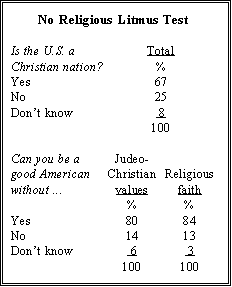 But the public’s low regard for people who are not religious does not undermine its support for religious pluralism. Even though most Americans (67%) consider the United States a “Christian nation,” an 84% majority believes that a person can be a good American even if he or she does not have religious faith. By more than three-to-one, Americans also reject the idea of churches and other houses of worship endorsing political candidates.
But the public’s low regard for people who are not religious does not undermine its support for religious pluralism. Even though most Americans (67%) consider the United States a “Christian nation,” an 84% majority believes that a person can be a good American even if he or she does not have religious faith. By more than three-to-one, Americans also reject the idea of churches and other houses of worship endorsing political candidates.
There also is broad opposition to the idea of government programs aimed at encouraging marriage. Nearly eight-in-ten Americans (79%) want the government to stay out of this area, while just 18% endorse such pro-marriage programs. Those with a high level of religious commitment are more likely to favor these programs, but as many as two-thirds of this group (66%) do not want the government to get involved.
As Congress prepares to reauthorize the nation’s welfare laws, the public is generally approving of the sweeping changes to the welfare system enacted in 1996. By 46%-17%, people say the current system works better. And though most remain generally critical of welfare, its overall image has improved markedly since the mid-1990s. While Americans are highly supportive of more generous assistance to the poor, they also endorse the concept of individual responsibility. Most people including a majority of those whose families have received welfare benefits blame poverty on the failures of individuals, not on society’s ills.
The growing debate in Washington over requiring young people to give a year of national service has not significantly changed long-standing attitudes on this issue. Roughly six-in-ten favor mandatory national service for men, while fewer (50%) support required service for women. There is a significant age gap on this issue, as Americans under age 30 solidly reject mandatory national service while those in older age groups endorse it.
The ongoing sexual abuse scandal involving Catholic priests is attracting considerable attention. There is broad condemnation of the church’s handling of the situation. Solid majorities of all religious groups surveyed including Catholics themselves say Church officials have mostly covered up cases of sexual abuse rather than dealing with the problem.
Other Findings
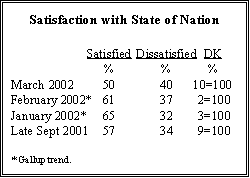
1. Public satisfaction with national conditions, which rose sharply in the wake of the Sept. 11 attacks, is now slipping. Just half say they are satisfied now, compared with about six-in-ten who expressed satisfaction with the state of the nation in Gallup polls in January and February.
2. Despite the public’s traditional aversion to foreign aid, roughly half the public favors providing assistance to help Afghanistan recover from the war.
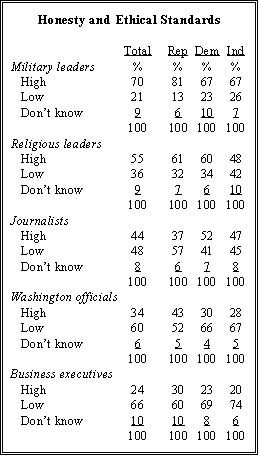 3. Public attitudes have remained stable over the past year on whether faith-based groups should be eligible for government funding to provide social services. Seven-in-ten back the idea in principle, which is virtually unchanged from last June.
3. Public attitudes have remained stable over the past year on whether faith-based groups should be eligible for government funding to provide social services. Seven-in-ten back the idea in principle, which is virtually unchanged from last June.
Unlike the mid-1990s, Americans now have higher regard for the ethics of Washington public officials than they have for business executives. And journalists are given higher ratings for ethics than public officials except among Republicans and highly religious Americans. Overall, military leaders get the highest marks for ethics, followed by religious leaders, journalists and Washington officials.
This survey is a joint project of the Pew Research Center and Pew Forum on Religion and Public Life. We wish to thank others who assisted in the design of the questionnaire: Missy Daniel, John Green, Scott Keeter and Kim Parker.


